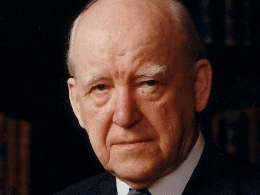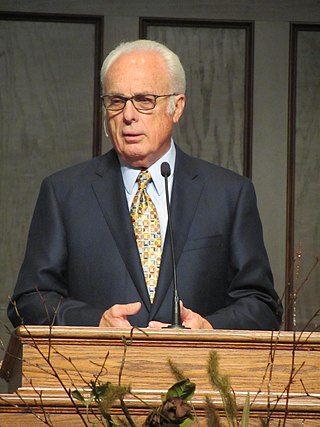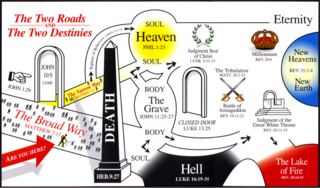
Calvinism is a major branch of Protestantism that follows the theological tradition and forms of Christian practice set down by John Calvin and other Reformation-era theologians. It emphasizes the sovereignty of God and the authority of the Bible.
Pentecostalism or classical Pentecostalism is a Protestant Charismatic Christian movement that emphasizes direct personal experience of God through baptism with the Holy Spirit. The term Pentecostal is derived from Pentecost, an event that commemorates the descent of the Holy Spirit upon the Apostles and other followers of Jesus Christ while they were in Jerusalem celebrating the Feast of Weeks, as described in the Acts of the Apostles.
Sola scriptura is a Christian theological doctrine held by most Protestant Christian denominations, in particular the Lutheran and Reformed traditions, that posits the Bible as the sole infallible source of authority for Christian faith and practice. The Catholic Church considers it heterodox and generally the Orthodox churches consider it to be contrary to the phronema of the Church.
Justificatio sola fide, meaning justification by faith alone, is a soteriological doctrine in Christian theology commonly held to distinguish the Lutheran and Reformed traditions of Protestantism, among others, from the Catholic, Eastern Orthodox, Oriental Orthodox and Assyrian churches. The doctrine asserts that it is on the basis of faith that believers are made right of their transgressions of the law of God rather than on the basis of what Paul calls "works of the law", sometimes called good works. This forgiveness is known as "justification". In classical Lutheran and Reformed theologies, works are seen as crucial evidence of faith, but the works themselves do not determine salvation. In contrast, Methodist doctrine affirms a belief in justification by faith that offers God's forgiveness, but holds that holy living with the goal of Christian perfection (sanctification) is essential for salvation.
The five solae of the Protestant Reformation are a foundational set of Christian theological principles held by theologians and clergy to be central to the doctrines of justification and salvation as taught by the Calvinism and Lutheranism branches of Protestantism, as well as in some sects of Pentecostalism. Each sola represents a key belief in these Protestant traditions in contradistinction to the theological doctrine of the Catholic Church, although they were not assembled as a theological unit until the 20th century. The Reformers are known to have only clearly stated two of the five solae. Even today there are differences as to what constitutes the solae, how many there are, and how to interpret them to reflect the Reformers' beliefs.
Michael Scott Horton has been the J. Gresham Machen Professor of Theology and Apologetics at Westminster Seminary California since 1998, Editor-in-Chief of Modern Reformation (MR) magazine, and President and host of the nationally syndicated radio broadcast, The White Horse Inn. Both Modern Reformation magazine and The White Horse Inn radio broadcast are now entities under the umbrella of White Horse Media, whose offices are located on the campus of Westminster Seminary California.

The Foursquare Church is an international Evangelical Pentecostal Christian denomination founded in 1923 by preacher Aimee Semple McPherson. Its headquarters are in Los Angeles, California, United States.
The means of grace in Christian theology are those things through which God gives grace. Just what this grace entails is interpreted in various ways: generally speaking, some see it as God blessing humankind so as to sustain and empower the Christian life; others see it as forgiveness, life, and salvation.

David Martyn Lloyd-Jones was a Welsh Protestant minister and medical doctor who was influential in the Calvinist wing of the British evangelical movement in the 20th century. For almost 30 years, he was the minister of Westminster Chapel in London.

The Catholic Charismatic Renewal (CCR) is a movement within the Catholic Church that is part of the wider charismatic movement across historic Christian churches.

John Fullerton MacArthur Jr. is an American Protestant pastor and author who hosts the internationally syndicated Christian radio and television program Grace to You. He has been the pastor of Grace Community Church, a non-denominational church in Sun Valley, California since February 9, 1969. He is currently the chancellor emeritus of The Master's University in Santa Clarita and The Master's Seminary.
The Alliance of Confessing Evangelicals is an organization of Christian individuals that believes evangelicals have largely forgotten the foundations of the Christian Gospel and is dedicated to calling on the Protestant churches, especially those that call themselves Reformed, to return to the principles of the Protestant Reformation. To that end, they produce print and internet resources, broadcast radio programs and organize conferences aimed at teaching the Reformed version of the Christian message.
In Protestant Christianity, the relationship between Law and Gospel—God's Law and the Gospel of Jesus Christ—is a major topic in Lutheran and Reformed theology. In these religious traditions, the distinction between the doctrines of Law, which demands obedience to God's ethical will, and Gospel, which promises the forgiveness of sins in light of the person and work of Jesus Christ, is critical. Ministers use it as a hermeneutical principle of biblical interpretation and as a guiding principle in homiletics and pastoral care. It involves the supersession of the Old Covenant by the New Covenant and Christian theology.

The term Evangelical Catholic is used in Lutheranism, alongside the term Augsburg Catholic, with those calling themselves Evangelical Catholic Lutherans or Lutherans of Evangelical Catholic churchmanship stressing the catholicity of historic Lutheranism in liturgy, beliefs, practices, and doctrines. Evangelical Catholics teach that Lutheranism at its core "is deeply and fundamentally catholic". The majority of Evangelical Catholic Lutheran clergy and parishes are members of mainstream Lutheran denominations.

The Gospel Halls are a group of independent Christian assemblies throughout the world that fellowship with each other through a set of shared Biblical doctrines and practices. Theologically, they are evangelical and dispensational. They are a conservative strand of the Open Brethren movement and tend to only collaborate with other assemblies when there is doctrinal agreement.
The Evangelical Protestant Church (GCEPC) or The Lutheran Evangelical Protestant Church (LEPC) is a mainline Protestant denomination under the General Conference of Evangelical Protestant Churches headquartered in Cayce-West Columbia, South Carolina, USA.

Protestantism is a branch of Christianity that follows the theological tenets of the Protestant Reformation, a movement that began in the 16th century with the goal of reforming the Catholic Church from perceived errors, abuses, and discrepancies.
Sola gratia, meaning by grace alone, is one of the five solae and consists in the belief that salvation comes by divine grace or "unmerited favor" only, not as something earned or deserved by the sinner. It is a Christian theological doctrine held by some Protestant Christian denominations, in particular the Lutheran and Reformed traditions of Protestantism, propounded to summarise the Protestant Reformers' basic soteriology during the Reformation.
The Remonstrant Confession or literally the Confession or Declaration of the Pastors which are called Remonstrants refers to the confession of faith of the Remonstrant brotherhood, published in 1621.
Evangelical theology is the teaching and doctrine that relates to spiritual matters in evangelical Christianity and a Christian theology. The main points concern the place of the Bible, the Trinity, worship, Salvation, sanctification, charity, evangelism and the end of time.







